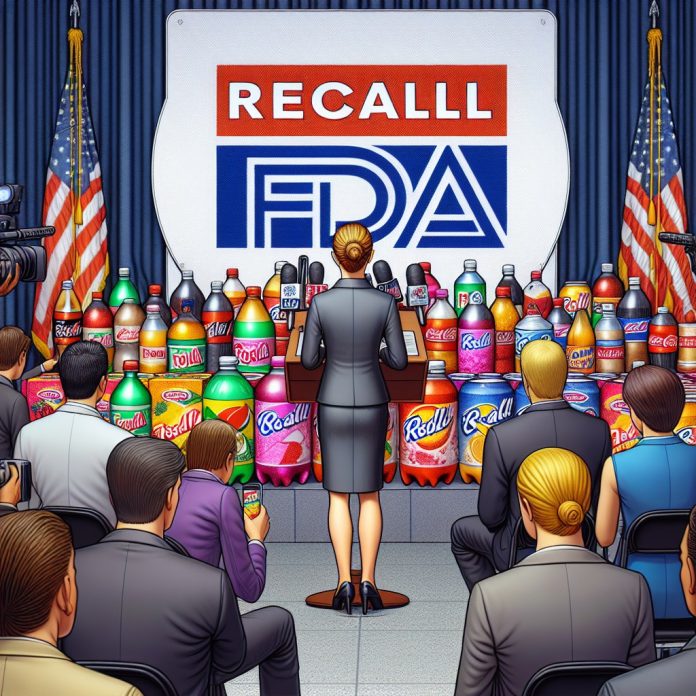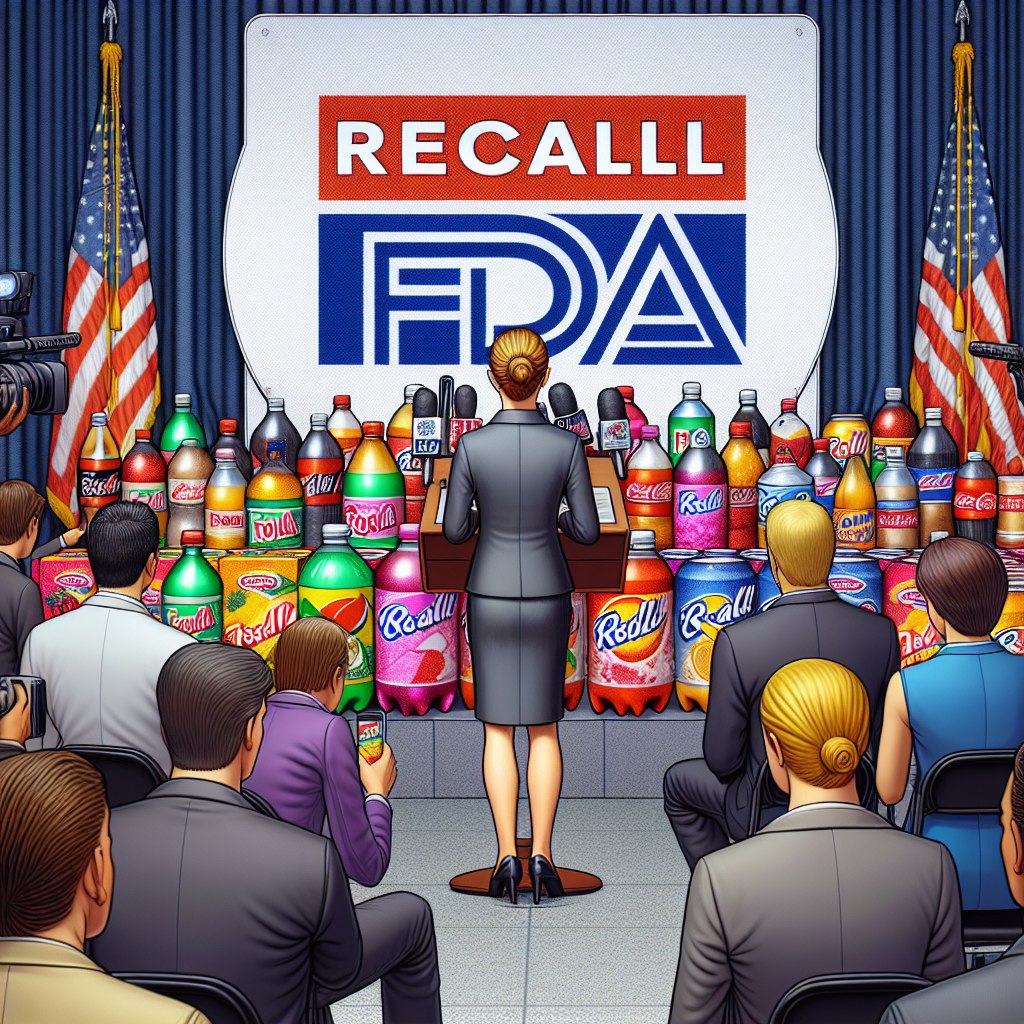
📢 Introduction The term “FDA soda recall” has been making headlines in recent years, raising concerns among consumers and industry stakeholders alike. But what exactly is an FDA soda recall, and what does it entail? In this comprehensive article, we will explore the concept of an FDA soda recall, the reasons behind such actions, and the implications for consumers and manufacturers.
🔍 What is the FDA? The Food and Drug Administration (FDA) is a federal agency of the United States Department of Health and Human Services. The FDA is responsible for protecting public health by ensuring the safety, efficacy, and security of drugs, biological products, medical devices, food supply, cosmetics, and products that emit radiation. The FDA also regulates tobacco products.
🍹 What is an FDA Soda Recall? An FDA soda recall occurs when a soda product is found to be potentially harmful to consumers and is subsequently removed from the market. This action is taken to protect public health and prevent further consumption of the affected product. Recalls can be initiated by the soda manufacturer voluntarily, or the FDA can mandate a recall if it determines that a product poses a significant risk to consumers.
📝 Types of Recalls Recalls are classified into three categories based on the severity of the potential health hazard:
- Class I Recall: This is the most serious type of recall. It involves a situation where there is a reasonable probability that the use of or exposure to the product will cause serious adverse health consequences or death.
- Class II Recall: This type involves a situation where the use of or exposure to the product may cause temporary or medically reversible adverse health consequences, or where the probability of serious adverse health consequences is remote.
- Class III Recall: This is the least serious type of recall. It involves a situation where the use of or exposure to the product is not likely to cause adverse health consequences.
🔍 Reasons for FDA Soda Recalls Several factors can lead to an FDA soda recall. Understanding these reasons can help consumers stay informed and make safer choices. Some common causes include:
- Contamination: Soda products can become contaminated with harmful substances such as bacteria, viruses, or chemicals. Contamination can occur during the manufacturing process, packaging, or distribution. For example, if a batch of soda is found to contain E. coli or Salmonella, a recall would be initiated to prevent illness.
- Mislabeling: Accurate labeling is crucial for consumer safety, especially for individuals with allergies or dietary restrictions. If a soda product is found to be mislabeled, such as containing undeclared allergens (e.g., nuts, dairy), a recall would be necessary to protect consumers with specific sensitivities.
- Foreign Objects: Occasionally, foreign objects such as glass, plastic, or metal fragments can find their way into soda products during production. The presence of these objects poses a significant health risk, and a recall would be issued to remove the affected products from the market.
- Chemical Contamination: Soda products can sometimes contain harmful chemicals due to issues in the manufacturing process or packaging materials. For example, if a soda is found to have elevated levels of a toxic chemical like benzene, a recall would be necessary to prevent consumer exposure.
- Packaging Defects: Packaging defects, such as compromised seals or faulty cans, can lead to contamination or spoilage of the soda product. In such cases, a recall would be initiated to ensure that consumers do not consume potentially unsafe products.
- Quality Control Issues: Problems in the quality control process can result in soda products that do not meet safety standards. This can include inconsistencies in flavor, carbonation levels, or other quality attributes that could affect consumer safety or satisfaction.
📅 Notable FDA Soda Recalls Over the years, there have been several high-profile FDA soda recalls that have garnered significant attention. Some notable examples include:
- Benzene Contamination in Soft Drinks (2005-2006): The FDA conducted tests on various soft drinks and discovered that some contained benzene levels above the acceptable limit. Benzene is a known carcinogen, and the recall led to increased scrutiny of soda manufacturing processes.
- Foreign Objects in Canned Soda (2010): A major soda manufacturer issued a recall after discovering that certain batches of canned soda contained metal fragments. The recall was prompted by consumer complaints and subsequent investigations.
- Mislabeling of Diet Sodas (2018): A recall was issued for a popular diet soda brand after it was found that the product contained undeclared aspartame, an artificial sweetener that can cause adverse reactions in individuals with phenylketonuria (PKU).
- Bacterial Contamination in Bottled Soda (2020): A recall was initiated for a batch of bottled soda due to contamination with harmful bacteria. The recall was issued after several consumers reported illnesses related to the consumption of the affected product.
📢 The Recall Process The recall process involves several steps to ensure that the affected product is removed from the market and consumers are informed. Here is an overview of the typical recall process:
- Identification: The recall process begins when a potential issue with a soda product is identified. This can be triggered by consumer complaints, routine inspections, or testing by the manufacturer or regulatory authorities.
- Investigation: Once an issue is identified, an investigation is conducted to determine the scope and severity of the problem. This may involve testing samples, reviewing production records, and assessing potential risks to consumers.
- Notification: If a recall is deemed necessary, the FDA and the soda manufacturer will work together to notify the public. This includes issuing press releases, posting recall notices on the FDA’s website, and informing retailers and distributors.
- Product Removal: The affected soda products are removed from the market to prevent further distribution and consumption. This may involve recalling products from store shelves, warehouses, and distribution centers.
- Consumer Guidance: Consumers who have purchased the affected soda products are provided with guidance on what to do. This typically includes instructions to stop consuming the product, dispose of it safely, and seek medical attention if necessary.
- Corrective Actions: The manufacturer must take corrective actions to address the issue that led to the recall. This may involve implementing new quality control measures, improving manufacturing processes, or revising labeling and packaging practices.
- Follow-Up: The FDA monitors the recall process to ensure that all affected products are removed from the market and that the manufacturer takes appropriate corrective actions. The agency may conduct follow-up inspections and testing to verify compliance.

👥 Impact on Consumers and Manufacturers The impact of an FDA soda recall extends beyond the immediate removal of the affected product. For consumers, a recall can cause concern and inconvenience, especially if the product is a popular or frequently consumed item. Consumers may need to find alternative products, and they may be wary of future purchases from the same brand.
For manufacturers, an FDA soda recall can have significant financial and reputational consequences. The costs associated with recalling and disposing of products, investigating the issue, and implementing corrective actions can be substantial. Additionally, a recall can damage a brand’s reputation and erode consumer trust, potentially leading to decreased sales and market share.
📈 Lessons Learned and Future Outlook The occurrence of FDA soda recalls underscores the importance of stringent quality control and safety measures in the food and beverage industry. Manufacturers must prioritize consumer safety and adhere to regulatory standards to prevent contamination, mislabeling, and other issues that can lead to recalls.
Looking forward, advancements in technology and increased regulatory scrutiny may help reduce the frequency and severity of soda recalls. Enhanced testing methods, improved traceability systems, and greater transparency in the supply chain can contribute to safer and more reliable products.
In conclusion, understanding “What is FDA soda recall?” involves recognizing the critical role of the FDA in safeguarding public health and the various reasons that can trigger a recall. By staying informed and vigilant, consumers can make safer choices, and manufacturers can uphold the highest standards of quality and safety.



















